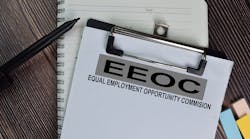It looks like more employers should have paid attention when the Equal Employment Opportunity Commission (EEOC) issued its own COVID-19 discrimination guidelines, covering responses to the disease itself as well as vaccination policies. It was recently revealed that between April 2020 and December 2021 more than 6,000 discrimination charges were filed.
The EEOC also received more than 2,700 separate vaccine-related charges after the vaccine became widely available and vaccine mandates were introduced to workplaces across the county.
Attorney Cassidy Mara of the Akerman law firm warns that employers should brace themselves for more such charges to be filed in the future.
The majority of the EEOC charges claimed violations of the Americans with Disabilities Act (ADA), while others cited racial, ethnic and gender discrimination under Title VII of the 1964 Civil Rights Act along with other anti-bias laws. Many of the EEOC charges related to vaccine mandates appear to cite violations of the ADA; however, the majority of vaccine-related charges raised other statutes.
The EEOC has not confirmed which other statutes were raised in vaccine-related charges; however, it is likely that religious exemption requests under Title VII are included, Mara observes.
Since the start of the pandemic, EEOC has brought at least three full-fledged lawsuits related to disability bias and COVID, and Mara said these could offer some guidance as to what employers can expect in the future.
In the first suit, EEOC alleged that an environmental, health safety and quality manager at a pharmaceuticals manufacturing facility in Georgia was fired after her employer denied her request to continue working from home because her heart condition heightened her COVID-19 risk. The complaint filed last September alleges that other employees were allowed to continue working from home after the facility reopened; however, the health and safety manager’s request was denied, and she was terminated.
Two more suits filed against a pharmacy and a coffee house in Texas alleged the employers discriminated against employees with disabilities that rendered them vulnerable to serious illness if they had contracted COVID-19.
EEOC holds that the pharmacy discriminated against a pharmacy technician with asthma who asked to wear a face mask at work as an accommodation of his disability to help protect him from the virus. It’s also alleged that the technician was harassed because of this request, taunted and humiliated for questioning management’s policy prohibiting masks. He was sent home on at least two occasions after asking to wear a mask, leading the technician to quit.
The coffee shop is said to have violated the ADA when it denied two baristas with disabilities reasonable accommodations and terminated their employment. The complaint says that, rather than provide the disabled employees reasonable accommodations to minimize customer contact, the baristas were not allowed to return to work until a vaccine for COVID-19 was developed, although they were ready and willing to work.
Regardless of the outcome, the case serves as a reminder that wise employers should not refuse to allow employees to work based in the hopes of protecting employees from illness, Mara explains.
“Employers must first ascertain whether there is a direct threat to the employee or others,” she said. “Only where an employee would pose a substantial risk of significant harm to his or her own safety or the safety of others that cannot be significantly reduced or eliminated by reasonable accommodations should an employer deny an employee with a disability the opportunity to work.”
To avoid becoming a defendant in one of these cases, make sure to check out the EEOC’s advice on how to avoid discriminating against your employees, and review the commission’s advice in this regard.

